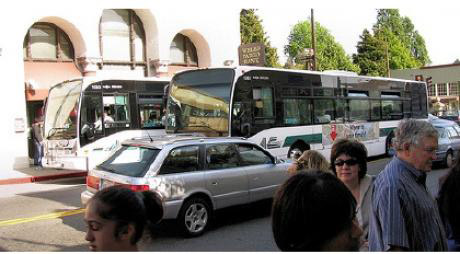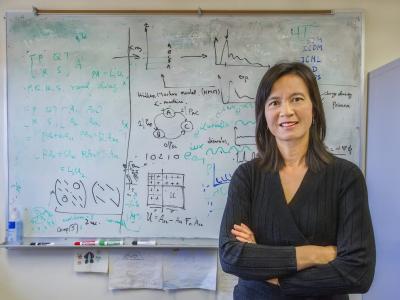Institute of Transportation Studies
Since its creation in 1947, the Institute of Transportation Studies has been one of the world's leading centers for transportation research, education, and scholarship by developing leading-edge innovations influencing movement of people and goods and advancing sustainability, economic health, and quality of life.

ITS serves as UC Berkeley’s nucleus for multidisciplinary transportation research — including engineering, the physical sciences, social sciences, and humanities; student engagement; and outreach by addressing transportation problems and solutions in aviation operations, environmental and health impacts of transportation, infrastructure management, intelligent transportation system, logistics, pavement engineering, traffic operations, traffic safety, transit operations, transportation and energy, and transportation planning.
Over 100 faculty, researchers, and staff members are associated with ITS through various research and educational activities. The expertise of the ITS faculty and researchers, coupled with physical proximity to Silicon Valley and the cities of San Francisco and Oakland, provide unparalleled opportunities to examine, propose, and test policies, technologies, and infrastructures.
More than 100 graduate students pursuing master and doctoral degrees currently study with ITS faculty and researchers. Over 125 graduates have gone on to university faculty positions and many more have become industry and government leaders.
The Institute’s programs receive an average of $20 million in extramural funds each year, one of the largest such totals at the University for a research facility or academic department. ITS leverages its core state funding by a ratio of about 20:1.
Affiliated Centers
Partners for Advanced Transportation Technology (PATH) addresses California’s multitude of economic, environmental, and transportation challenges, while developing the next generation of transportation professionals in vehicle automation; vehicle and infrastructure connectivity; transportation safety and security; innovative transit solutions to improve ridership; advanced transportation decision support; and fleet and vehicle energy and emission reduction.
Berkeley DeepDrive (BDD) is at the forefront of research on intelligent autonomy through the integration of state-of-the-art technologies in computer vision and deep learning and application to autonomous vehicles and robotics.
Transportation Sustainability Research Center (TSRC) researches innovative and readily-applied solutions that incorporate transportation technology, infrastructure, and human behavior with advanced vehicles and fuels; transportation energy systems; mobility justice (social and racial equity); mobility and the sharing economy; transportation infrastructure; passenger transportation systems; and goods movement.
Affiliated with both ITS and the School of Public Health, Safe Transportation Research and Education Center (SafeTREC) conducts research, provides graduate-level courses, coordinates major transportation safety programs for the State of California, and hosts community-based training programs in the following research areas: technology for road safety, large-scale data analysis and modeling, and policy analysis and community outreach.
National Center of Excellence for Aviation Operations Research (NEXTOR) is a consortium sponsored by the Federal Aviation Administration, consisting of UC Berkeley and four partner universities. Research areas addressed by NEXTOR include advanced air traffic management systems, air traffic safety and security, and the performance and productivity of the nation's aviation system.
University of California Pavement Research Center (UCPRC) carries out leading-edge research on a wide range of pavement-related fields. With facilities at both UC Berkeley and UC Davis, the UCPRC provides state-of-the-art knowledge, advice, and technology to practitioners, research community, and decision-makers that include Caltrans, FHWA, FAA, CalRecycle, CARB, and local governments.
Smart Cities Research Center is a collaboration between UC Berkeley and Lawrence Berkeley National Laboratory to improve energy-efficient mobility systems by taking advantage of a new generation of data that has been collected by mobile devices by studying mathematical models and data analytics; working with industry and public agencies to collect and model data; using novel approaches to model interdependent energy and transportation systems; leveraging analytics capabilities of rich geospatial data; developing novel approaches to studying multiple aspects of urban dynamics; and producing transportation development scenarios.
The Transportation Library is among the world's leading transportation libraries. It serves academic researchers and students throughout the UC system, as well as local, state and federal transportation agencies. Private clients can join its Corporate Circle Program to enjoy enhanced reference and borrowing services.
TechTransfer is the California transportation community's source for professional development. The program hosts training, workshops, conferences, and executive education in the transportation-related areas of planning and policy, traffic engineering, project development, infrastructure design and maintenance, safety, environmental issues, railroad and aviation.

